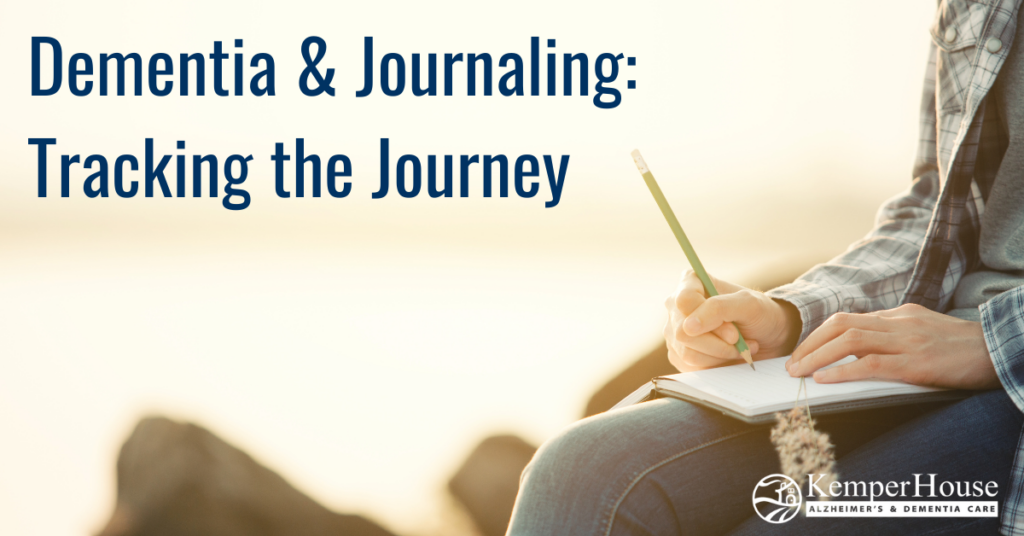
Dementia & Journaling: Tracking the Journey
You’ve probably heard or read about the benefits of keeping a journal. Perhaps it was Oprah recommending that you record five things that you’re grateful for every day, or maybe it was a teacher or counselor who viewed journaling as a way to clarify your thoughts and feelings and to help solve problems. Regardless of the reason, there are great benefits to journaling, especially if you’ve been diagnosed with dementia or you’re a caregiver to or know someone who has been diagnosed.
Scientific evidence supports journaling. While the left side of your brain, which is analytical and rational, is occupied, the right side is free to create and feel. Expressing feelings in writing isn’t just a good way of tracking the progress of dementia and looking for specific trends; it’s also a tool to help orient the person with dementia. When dementia starts to make it difficult to find the right words, writing can reduce feelings of powerlessness and provide a way of processing the changes that are occurring.
Here are some more simple tips to keep in mind:
- Start with the day, the date, and the year. Include a brief description of the weather if you feel moved to do so.
- Allow just 15 minutes to write, perhaps first thing in the morning, to develop the ritual of writing.
- Forget about grammar, spelling, and punctuation! Just let the feelings and words flow, whether it’s one sentence or an entire page.
- Technology can be useful if handwriting is too difficult. A tape recorder, video camera, typewriter, or computer can provide the means for continuing the routine of journaling.
- If the loved one feels that the journal is private, it’s important to respect that, despite a desire by the caregiver to look for changes in the stage of the disease.
How can journaling be transformative to your life? Journaling has been known to:
- Reduce stress. A caregiver’s health and anxiety level have a direct impact on the person they care for. Caring for yourself by reducing your stress level will better enable you to be present for what comes your way.
- Provide respite. Caregivers report journaling slows them down, allowing time for deeper breathing and calm during a busy day. Time for yourself, even 10 minutes, can help a caregiver re-focus and recharge.
- Deflect anger. Rather than shouting negative words, placing angry words on a page is a positive release. As you write about anger, you will probably notice a decrease of emotion moving toward a calmer state.
- Provide time for reflection. Time to reflect is a precious commodity in our modern world and certainly for the busy caregiver.
- Develop self-worth. Caregivers realize the many things they are doing right by writing down daily events and thoughts.
- Develop personal insight. “Journaling helps me realize I am not a patient person. I need to work on being a more patient caregiver.” (From a caregiver’s journal)
- Provide clarity. When difficult situations present themselves, journaling helps identify the significance of events. The simple act of writing words on a page/computer brings clarity, a truth known in our professional lives but often overlooked as a personal tool.
- Enhance personal development. “Once my caregiving journey was over, my journal helped show me the way forward.” (From a caregiver’s journal)
- Clarify values. “The real meaning of friendship came through often as I recounted my struggles with my siblings.” (From a caregiver’s journal)
- Reveal information and insights for others. While a journal is primarily meant for you, some discoveries and insights are meant to be shared with others. When my father was ill, I shared an important personal insight with a friend experiencing a similar family situation.
Goodwin says that it doesn’t matter if what’s recorded is legible or not. “Journaling provides both the caregiver and care recipient the opportunity to reach beyond themselves and communicate their complicated thoughts and feelings.” It’s a way to give a voice to conflicting emotions in a safe way.
Sources: aplaceformom.com & activityconnection.com


